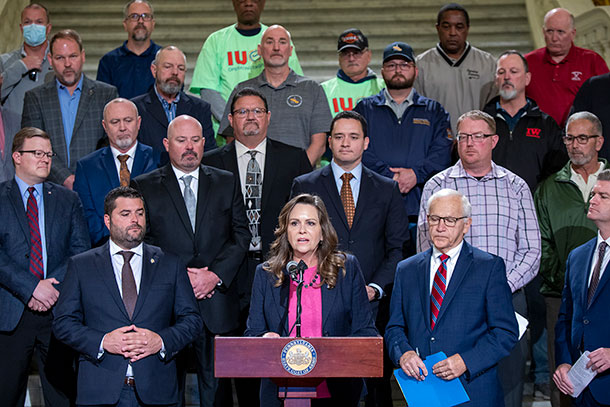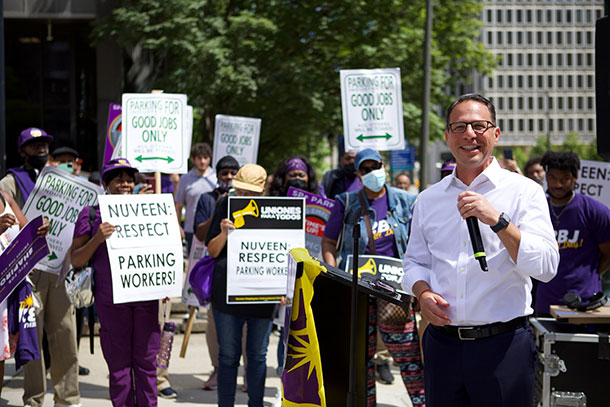Labor
Angela Ferritto, Mark Lynch: These are the fresh faces on the front lines
The state’s top unions have welcomed a new generation of leaders in the midst of a youth movement in unionization: A City & State analysis.

State essential workers march in Philly with Attorney General Josh Shapiro Dave Kotinsky
Within the span of a month, the AFL-CIO welcomed a new president at both the state and national levels – and for the first time at each organization, a woman was in charge.
For Liz Shuler, taking over the role as president of the national organization of unions comes after the death of longtime leader Richard Trumka. In Pennsylvania, it was a little more complicated. Angela Ferritto found herself assuming the role of president just weeks after being elected secretary/treasurer. Following a workplace misconduct investigation involving president-elect Frank Snyder, Ferritto was taking over for the man who was on the ticket with her.
These two landmark precedents didn’t happen in a vacuum, either: From electricians and steelworkers to boilermakers and steamfitters, multiple unions in Pennsylvania have welcomed new leadership within the last year. This changing of the guard comes at a time when unionization efforts are being rejuvenated in various sectors, most visibly by Starbucks and Amazon workers who have been making headlines for their successful collective bargaining initiatives.
As new union leaders take the reins and a nascent workers movement seeking fair working conditions allies itself with organized labor, the question becomes: Is this the start of a union renaissance, or is it just a dead-cat bounce?
The official changeover started on June 12, when Shuler stood in front of the AFL-CIO’s constitutional convention for the first time as its president-elect. Delivering remarks in the Pennsylvania Convention Center in Philadelphia to members of the 56 unions represented in the AFL-CIO, Shuler reflected on her path to leadership as the first woman to be elected as the organization’s president and her vision for the labor movement going forward.
“We are going to organize and rise together to break every ceiling – the ones made of glass, but also those made of steel and silicon,” she exhorted. “We will elevate women in our movement; center the people who have been excluded, paid the least but who, nevertheless, step up the most. My path and style as a leader are different. They reflect the shift we’re seeing in leadership in all walks of life. Less top-down, more inclusive and collaborative.”
Like Shuler’s victory, Ferritto’s was unexpected and unprecedented – and, at the same time, consistent with the current climate of change being seen at virtually every level of organized labor, both in the state and across the country.
“We women have been an integral part of the labor movement since the beginning of the movement,” Ferritto told City & State. “I think that it’s encouraging to see the changing face of labor. But it’s connected to all of our members and I think that it’s reflective of who our members are.”

Ferritto’s path to the presidency wasn’t straightforward, however. Then-president Richard Bloomingdale – who had served as the head of the Pennsylvania AFL-CIO since 2010 – announced his retirement earlier this year, leading to a shared ticket between Ferritto, who was running for secretary/treasurer, and Frank Snyder, who was running for president.
Despite both winning their respective elections in March, more change was to come. Just days before Snyder was set to take office in May, a workplace misconduct investigation led to his sudden retirement – and to Ferritto taking his place at the top.
As the state union’s first female leader, coming in after a controversy involving workplace harassment was just another element Ferritto had to handle during her transition. Shuler, who took over national leadership during the same time period, said Ferritto is the perfect person for the job.
“Angela Ferritto is the absolute right person to lead the PA AFL-CIO through this period of growth and evolution,” Shuler said. “I look forward to working with her and all state federations to continue to advance workers’ rights and build the labor movement’s next chapter. Working together, we will continue to fight for human dignity and respect in the workplace – both inside and outside the movement.”
Ferritto, an Erie native, said the movement is not about the leaders, but the people they represent.
“Throughout my time spent in the labor movement, I’ve seen many strong, smart, powerful women come before me who may not have risen to this level of power in the ranks. But I definitely stand on their shoulders today,” Ferritto told City & State. “The power of this movement comes from the people you know. It’s not necessarily the person behind the podium; it’s about the people who were out in the audience and how we cultivate their strength and their power.”
Like many labor leaders, Ferritto was raised in a union family. Both of her parents were union members and so were two of her siblings. She is a member of AFSCME, where she served as the president of her local union before joining Council 13 leadership in 2010.
While turnover at many unions is common given their constitutions and conventions, it’s not often Pennsylvania has seen so many longtime leaders step away from their positions in the same year. According to lawmakers and experts, the current climate of change is an ideal moment for unions to refocus and realign with their members, while still holding onto the relationships and practices that helped them gain the political power they have today.

State Sen. Camera Bartolotta, a Republican from Washington County, said unions have always done well developing from within. As chair of the chamber’s Labor and Industry Committee, she’s certain the new leaders will pick up right where their predecessors left off.
“I don’t know that you’re really going to be losing a lot of institutional knowledge because all of our trades are very, very good at communicating with their members with encouraging growth from within,” Bartolotta said. “The whole idea of an ‘old boys’ club’ or whatever – it doesn’t exist. They train people, they work with people, they educate people. They give every kind of person the ability to have a phenomenal career and family-sustaining job.”
If there’s someone who knows about having big shoes to fill, it’s Mark Lynch, Jr., Lynch took over for John J. Dougherty, known as “Johnny Doc,” as business manager of IBEW Local 98 in Philadelphia last November after Doughety was convicted on federal bribery charges.
After Dougherty retired last year amid legal troubles, Lynch was the next in line. The son of a 42-year union member, Lynch joined the union in 2006 and most recently served as its safety coordinator.
Local 98 – and all of the political power that it has accrued over the years – is now in his hands as he looks to maintain its influence while distancing it from its controversial past.
“I know that we’re going to continue to be that force in the city,” Lynch said. “I tell people there are 100 ways to skin a cat. Some people do things one way and then we go the other way … but we will still be involved and we will still be effective on anything that goes on in the city.”
Lynch and Ferritto are not alone: Unions including the Pittsburgh-based United Steelworkers, now led in District 10 by Director Bernie Hall, and Boilermakers 154, now headed by Business Manager Michael Stanton, have welcomed new leadership – and are now leading a labor movement that’s been the subject of renewed interest in recent years by a new generation of workers unafraid of speaking out against unfair labor practices and stepping up for representation.
Kate Bronfenbrenner, director of labor education research at Cornell University’s School of Industrial and Labor Relations, said this latest labor movement is unlike any she’s seen before.
“I think that there’s more union activity than there’s been in certainly my lifetime studying the labor movement, which is more than 60 years,” Bronfenbrenner told City & State. “The other thing that’s important is that young people are more active than ever. Those 18 to 30, that group is more active … this is a new phenomenon.”

Bronfenbrenner added that this movement likely began after the 2008 recession but that the pandemic was the final straw for many front-line workers. “Then comes the pandemic where people weren’t just sacrificing in terms of income and benefits and losing work, but they were risking their lives and risking their family’s lives,” she said. “It’s one thing to take a pay cut; it’s another thing to go to work and maybe die. It changes the whole calculus.”
With front-line workers from businesses like Starbucks now at the forefront and calling to redefine the basic standards workers require, Lynch said the efforts by those young baristas to fight for better wages and benefits have given new life to the modern labor movement.
“The transition and turnover is kind of rejuvenating the union industry,” Lynch said. “I’m excited for where the labor movement is going. I’m excited for the Starbucks of the world. So, kudos to them and everybody else (who) wants to organize and say it’s OK to stand up for what’s right.”
Hall said the messaging may seem obvious, but unions need to maintain their focus on listening to members and expanding relationships across the commonwealth. Not putting the people first is what led to the issues and grievances being brought up today, he said.
“I don’t want to sound overly simplistic, but we’re really getting back to the rank-and-file members,” Hall said. “It’s easy to get caught up in state politics in the day-to-day but we have really prioritized making sure that our members – on the shop floor and in our local union – have their voices out front and center.”
As these unions look to continue flexing their political muscles, the commonwealth is in the middle of an election cycle largely focused on the economy and the rising cost of living. Democratic gubernatorial candidate and Attorney General Josh Shapiro has already garnered endorsements from unions across various sectors.
Shapiro, who marched with SEIU members in mid-August in Philadelphia as they rallied in support of SP+ parking workers seeking to organize, has been endorsed by the statewide AFL-CIO Executive Council, Pennsylvania Professional Fire Fighters Association, Philadelphia Building Trades Council and SEIU State Council, among others. When asked if the turnover in leadership or youth involvement would affect the budding labor movement, Shapiro said the energy he’s seen on the campaign trail from organizers is a promising sign.

“The story of our democracy has always been written not so much by people with titles but by ordinary citizens who rise up and demand more change, demand progress, demand forward momentum – and that’s what you’re seeing in the labor movement,” Shapiro told City & State. “You’re seeing it in coffee shops and parking lots and places in between (and) across Pennsylvania – people rising up demanding more change, and demanding better work conditions and better wages – and I support their efforts.”
April Verrett, another new labor leader, attended the march alongside Shapiro. Verrett took over as the secretary/treasurer of the SEIU International Board in June. She said the modern labor movement requires young people to be energized and involved. Whether the newcomers follow in the footsteps of labor leaders in the past or not, Verrett said, unions are already on the path to modernizing and showing off their collective political power.
“They’re playing the game by their rules, and they’re making corporations like Starbucks and Amazon take notice,” Verrett said. “We need all of the leaders that we can get to step up and take part and have those tough conversations about how we create a 21st-century labor movement for 21st-century workers to solve 21st-century problems.”
